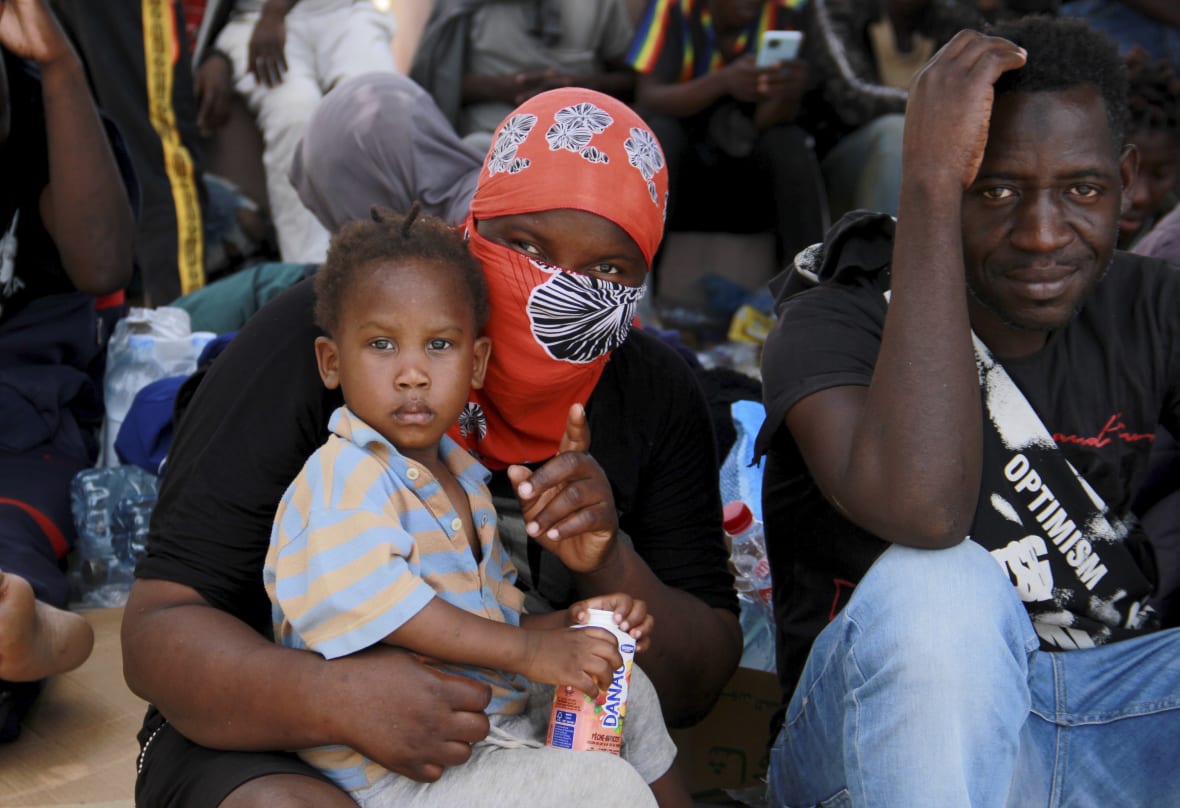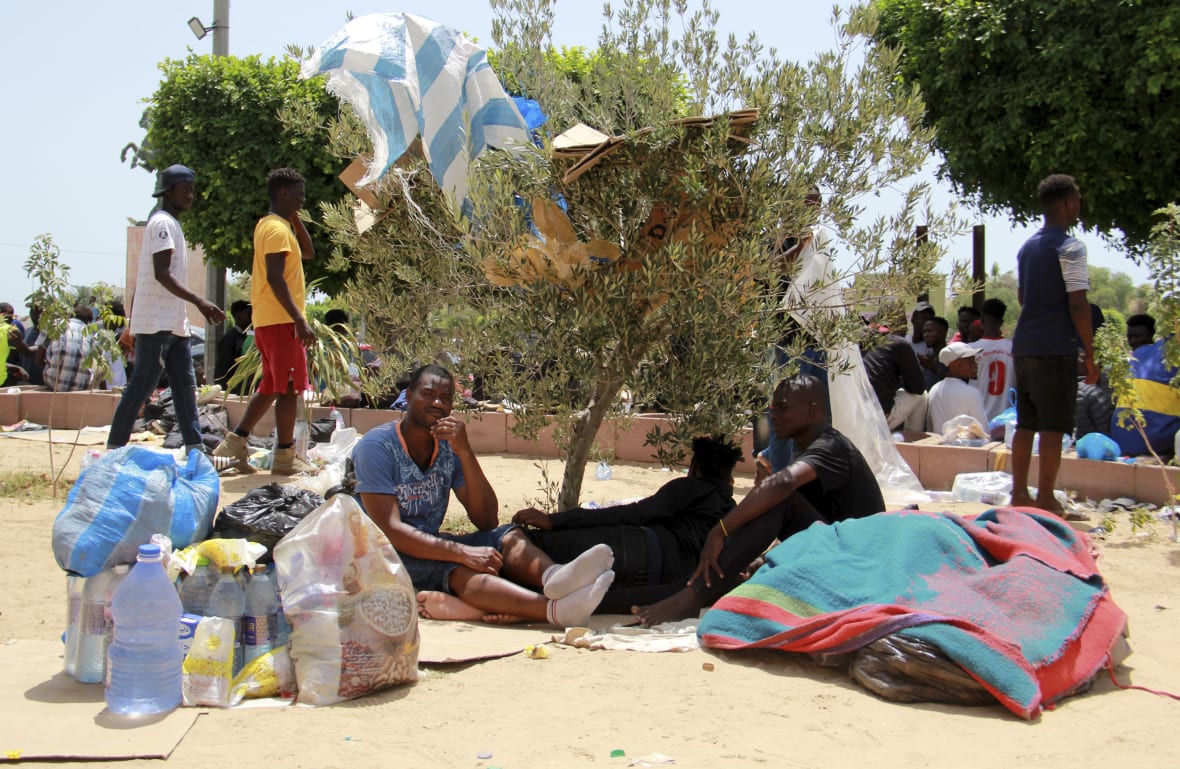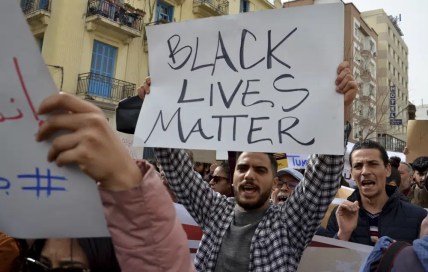Under pressure, Tunisia takes back 500 migrants stuck in dangerous no-man’s land
Migrants accused the Tunisian National Guard of beating them “like animals, like slaves,” and assaulting women in the group.
TUNIS, Tunisia (AP) — At least 500 migrants from sub-Saharan Africa have been transferred back to Tunisia after being pushed into a dangerous no-man’s-land on the Libyan border and trapped for a week there without access to basic necessities, aid agencies said Tuesday.
The group was driven out earlier this month amid a spike in anti-migrant and racism-fueled tensions linked to a killing in the Tunisian port city of Sfax, a hub for traffickers organizing risky and sometimes deadly boat journeys across the Mediterranean Sea to Italy.

One such boat sank Sunday off the Tunisian coast. Coast guard officers retrieved one body, rescued 11 people and declared 10 others as missing, the Sfax prosecutor’s office said.
The fate of hundreds of migrants pushed into the Tunisia-Libya border region drew concern from international humanitarian groups. It also raised questions about Tunisia’s migration policies, weeks after the European Union offered Tunisia’s increasingly authoritarian government $1 billion to help its slumping economy — and to beef up border services to stop migrant boats from crossing to Europe.
A 29-year-old man from Ivory Coast said that uniformed men had taken migrants from their homes in Sfax in the middle of the night in early July and brought some 600 people to the border area between the Mediterranean Sea and the Tunisian-Libyan land border near Ben Guerdane.
Speaking to The Associated Press last week, he accused the Tunisian National Guard of beating them “like animals, like slaves,” and assaulting women in the group. He claimed that Libyan security at the border fired shots into the air to keep the civilians at bay.
The name of the man, who said he entered Tunisia legally in 2019 and works on a golf course, is being withheld for safety reasons.
On Tuesday, he said that he and 100 others have now been transferred away from the border to the inland Tunisian town of Medenine, where they are sleeping in a courtyard. Temperatures in the area climbed above 40 degrees Celsius (104 Fahrenheit) on Tuesday.
Tunisian Red Crescent spokesperson Mounir Ksiksi said Tuesday that about 500 people from sub-Saharan Africa who had been trapped in the border zone were transferred Monday to other regions of Tunisia.
A spokesperson for the International Organization for Migration said 158 migrants were transferred to a shelter in the town of Tataouine and another 353 people transferred to public structures in Medenine. The IOM said Tunisian authorities have not provided information about next steps for the migrants.
Under pressure from humanitarian agencies, Tunisian President Kais Saied on Sunday ordered the Tunisian Red Crescent to bring aid to the migrants. Saied stoked racist incidents earlier this year by railing at Black Africans who transit through Tunisia toward Europe.

On Monday, Saied denied mistreatment of migrants by Tunisian authorities, and lashed out at migrant traffickers he said were seeking to “destabilize Tunisia.” He called for coordinated efforts to “to tackle the origins, sources and causes of the problem” in addition to security measures.
Tunisian Red Crescent head Abdellatif Chabou said he headed to the border region to oversee an operation to bring food and water to the migrants and allow them to contact their families. Three people needing medical aid were transferred to a local hospital, including a pregnant woman, Chabou told local broadcaster Radio Mosaique on Monday.
The president of the Tunisian Human Rights Observatory, Mustapha Abdelkebir, said the migrants had no access to basic sanitation and were trapped between armed forces on either side of the border, exposed to extreme heat without shelter.
The International Organization for Migration said it was working with Tunisian authorities to ensure humanitarian assistance, and called on Tunisia to respect “the dignity and rights of all migrants” and to counter “harmful and negative rhetoric, hate speech and hate crimes.”
The Tunisian Human Rights League called for a crisis center to address the tensions in Sfax.
Opposition politician Nejib Chebbi accused authorities of stoking prejudice and deporting the migrants “because they are Black. It is a disgrace, and this will remain a dark page in our history.”
Reports have also emerged of migrants pushed back to Tunisia’s border with Algeria, whose government routinely expels migrants south into the Sahara desert. Tunisia’s Defense Ministry would not comment Tuesday on the reports.
TheGrio is FREE on your TV via Apple TV, Amazon Fire, Roku, and Android TV. Please download theGrio mobile apps today!


